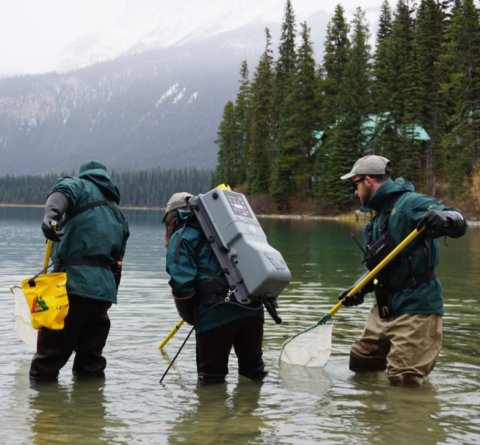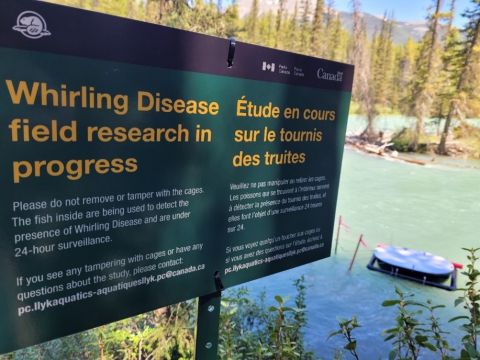
Image: Parks Canada staff electrofishing in Emerald Lake, Yoho National Park, to test for the presence of whirling disease.
Photo credit: Parks Canada
Whirling disease is a growing concern for aquatic ecosystems, affecting fish populations and challenging conservation efforts in waterways throughout western Canada. Caused by a parasite native to Europe, it affects fish in the salmonid family, including trout, whitefish and salmon. After generations of co-evolution with certain trout species in Europe, the parasite had no noticeable impact on populations. However, it was unintentionally introduced to new regions around the world where fish had never been exposed. By the 1990s, fisheries biologists in the United States determined that whirling disease was responsible for declines up to 90% in some wild fish populations. At that time, the parasite had not yet been detected in Canada.
Fast forward to 2016 when the parasite was confirmed for the first time in Canada in Banff National Park. Parks Canada introduced management tactics to prevent the spread of the parasite between waterbodies by restricting the movement of fish or fish parts, mud, water, and dirty recreational gear, including:
- catch-and-release angling in most waterbodies;
- a ban on felt-soled wading boots;
- closures to in-water activity in sensitive trout habitat; and,
- a mandatory requirement for visitors to “Clean Drain Dry” and obtain a permit prior to recreating on water.
In addition to enhanced management actions, Parks Canada staff conducted early detection monitoring for the parasite in Yoho and Kootenay national parks from 2016 to 2020 with no detections in British Columbia.

Image: Sentinel fish cage used to detect the presence of whirling disease in park waters
Photo credit: Parks Canada
In 2023, Parks Canada received a report of clinical signs of whirling disease in Emerald Lake in Yoho National Park. At this time, fish samples confirmed the presence of the parasite at the inlet of Emerald Lake, as well as at five sites throughout the Kicking Horse River, a Canadian Heritage River running through Yoho National Park. This was the first confirmed detection of the parasite in British Columbia.
The management actions implemented in 2016 may have slowed the spread, but with high visitor use and low compliance with regulations, they did not prevent the parasite from being introduced to Yoho National Park. As this was the first detection of the parasite in BC, Parks Canada made the decision to close Yoho National Park to in-water recreation to contain human-mediated spread and help protect other waterbodies in the province. Kootenay National Park was also closed to in-water recreation to prevent the introduction of the parasite under current management tactics. These closures allow Parks Canada time to:
- understand the current distribution and potential impacts of the parasite; and,
- review potential management options to prevent the introduction of aquatic invasive species, such as whirling disease.
Parks Canada continues to work on these objectives; however, this takes time. Reopening waterbodies will be based on scientific evidence and a consistent, data-driven approach across the mountain national parks. Parks Canada is evaluating options to balance recreation with ecosystem protection and will communicate future changes as more information becomes available. The great news is you can do your part to help protect park waters too! Respect closures and restrictions and always Clean Drain Dry your gear after recreating on water. Thank you for protecting these special places!
For more information please see: Protect park waters: preventing aquatic invasive species.